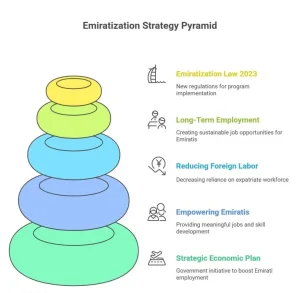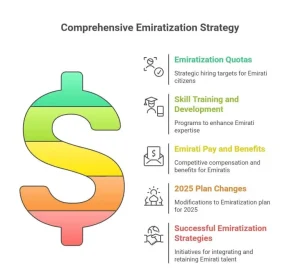The Emiratization plan is a strategic economic plan by the government of Dubai to increase the number of UAE resident employees in the private sector. It looks to empower Emiratis with fulfilling occupations, lessen dependency on foreign labor, and generate long-term employment possibilities.
Setting Emiratization targets for businesses, offering training and development opportunities for Emiratis, and providing benefits to businesses that acquire and keep Emirati talent are just a few of the initiatives included in the program.
Understanding Emiratization Plan
The Emiratization strategy plan is a policy to rectify labor market and workforce imbalances. This policy seeks to play a key role in changing the UAE labor market by encouraging the employment of UAE citizens.
The strategy was carefully planned, and increasing Emirati citizens’ participation in public and private sectors is the goal. Emiratization Law 2023 adds a new dimension to the Emiratization program’s implementation and compliance.
Emiratization aims to empower the nation’s residents by giving Emiratis meaningful employment opportunities and encouraging a broad talent pool. It is not limited to a system of quotas. Instead, it emphasizes career advancement, training, and improvement of skills.
This program is an excellent method that will undoubtedly reward local talent, minimize unemployment among Emiratis, maintain the country’s economic stability, and result in an upgraded and competitive skill set. As part of the laws, hiring a certain percentage of UAE nationals in organizations and businesses across the country is now required.

Rules and Regulations of Emiratization in UAE
Although the Emiratization program aims to include local talent in the broad dynamics of the business community, the Emiratization rules are not identical throughout the various sectors. Many variants can be quantified for different businesses and even the Emirates. But here are the general Emiratization norms in the UAE that everyone must follow.
Emiratization Quotas for Employment in the UAE
Emiratization quotas are a strategic plan which is established by the government of UAE for hiring more Dubai citizens for the private sector. These quotas differ according to the company’s size and industry sector. Companies with fifty or more employees must achieve a minimum of 2% yearly increase in Emiratization of skilled employment, whereas smaller businesses with 20-49 employees have special hiring targets for Emirati nationals.
Financial consequences might be implemented for noncompliance with Emiratization quotas. These quotas are in place to encourage growth in the economy in UAE, decrease dependence on foreign labor, and boost Emirati participation in the workforce.
Skill Training and Development for Emiratis
Skill training and development programs are the best Emiratization strategy. These trainings provide essential skills and enhance the expertise of local citizens with information for career development and to compete in this thriving market. The government offers various incentives to organizations for hiring local talent to train and create a highly skilled Emirati workforce and drive economic growth and success.
Emiratis Pay and Employment Benefits
Emirati employees usually receive competitive compensation and benefits, including housing allowances, health insurance, and transportation. The monthly compensation should not be less than AED 4,000.
Many workers in government sectors receive competitive pay, housing allowances, and healthcare coverage. Private-sector employees also enjoy competitive pay, which is generally tax-free, and generous benefits like housing, transportation, and education allowances. Citizens may also be eligible for land grants or subsidized housing, which might improve their financial situation.
Major Changes in the Emiratization Plan in 2026
There have been significant modifications to the Emiratization plan. While the Emiratization law remains unchanged, several amendments have been made to make it more acceptable to the local community. The key modifications are:
Maximize Scope
The UAE government now requires small and medium-sized private firms with 20 to 49 employees to hire at least one Emirati by 2024 and two by 2026. Noncompliance will result in repercussions beginning at AED 96,000. This applies to over 20,000 organizations across multiple industries.
Non-Compliant Fines and Penalties
Businesses that do not meet their Emiratization targets face fines and penalties. They can be:
- Minimum fee: Up to 2026, any unemployed Emirati employee will face a monthly minimum fee of AED 6,000.
- Work permit applications may be suspended if fines are not paid in full.
- Company demotion: Under the Classification Law, a company will be demoted to the third category if it fails to satisfy the Emiratization quotas for two consecutive years.
UAE Economic Sector
The new requirements for small businesses apply across the key sectors, including:
- Administrative and support services
- Arts and Entertainment
- Construction
- Education
- Financial and insurance activities
- Healthcare and social work
- Hospitality and residency services
- Information and communications
- Mining and quarrying
- Professional and technical activities
- Real estate
- Transformative industries (e.g., renewable energy)

Successful Emiratization Strategies
Emiratization entails integrating UAE natives into the workforce and developing and retaining them, resulting in a holistic personnel management cycle.
Skill Development Workshops
One of the primary initiatives for successful Emiratization is to improve Emirati education and training. The “National Strategy for Higher Education 2030” reflects this, which aims to strengthen the labor market and prepare future generations with technical and practical skills.
The Emiratization rule in UAE applies to everyone. Several programs have been undertaken to give Emiratis chances for training and development. The legal authorities use the Government’s eLearning Portal to provide expert training and development for federal government personnel. Similarly, the government’s particular systems include eLearning programs built in partnership with international academics and training partners.
Supportive Work Environment
Creating an inclusive work atmosphere is another critical tactic. Companies must ensure that their workplace policies and procedures follow Dubai’s values and culture. They should also make sure that among all employees there is no competition of color, gender, or religious affiliation, have equal opportunities for advancement in their professions.
Companies have launched programs to encourage diversity and inclusion. These include adjusting recruitment techniques, promoting diversity, developing inclusive places, and implementing inclusive policies.
Attract Emiratis for Employment
Recruiting Emiratis from the business community can be difficult due to the disparity between educational performance and corporate life demands. However, the UAE government has introduced several programs and policies to encourage Emiratization in the business sector, such as quotas for local hiring and mandating organizations to meet Emiratization ratios.
Developing a strong employer brand is critical to attracting and maintaining Emirati talent. Companies may recruit Emirati talent by promoting their values, mission, and culture through focused marketing efforts, social media engagement, and networking events.
Conclusion
The Emiratization plan is the UAE government’s strategy to expand the number of Emirati nationals in the commercial sector. It aspires to develop long-term job opportunities, promote economic growth, and strengthen the national workforce. This program promotes good transformation in the UAE’s labor market by establishing clear goals and offering support services.
FAQs for Emiratization Plan
What is an Emiratisation plan, and why is it important for private businesses?
Companies in the UAE are now required to hire local talent and comply. This policy is known as Emiratisation. It has become necessary because it ensures legal compliance, avoids penalties, and helps companies access government incentives and support.
How do companies create an effective Emiratisation plan?
Companies implement Emiratisation and fulfil quotas by understanding legal targets and assessing current workforce gaps. Then they plan recruitment, training, and retention efforts. Companies often use the Nafis platform to identify Emirati candidates and shape training to close any skills gaps.
What are the key targets or quotas in a typical Emiratisation plan?
Companies with 20-49 employees in certain sectors must hire at least one Emirati in 2026 and an additional one by 2027. On the contrary, larger firms must increase their Emirati skilled workforce by about 2% annually, aiming for around 10% by 2026.
How does government support (like Nafis) integrate into Emiratisation plans?
The government introduced the Nafis programme to help companies fulfil Emiratisation quotas. It helps companies connect with trained Emirati talent. They offer financial support or incentives and help with training programmes. Companies are encouraged (or required) to register with Nafis to benefit from these supports.
What metrics should companies track to monitor Emiratisation success?
Key metrics include:
- Number or percentage of Emiratis hired vs targets
- Retention rate of Emiratis in the company
- Growth in skilled roles filled by Emiratis
- Compliance history (penalties, violations)
- Use of Nafis support and training programme completion among Emirati employees



